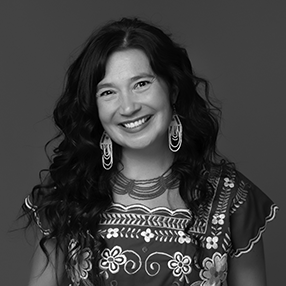Inner
Our psyches resemble the bordertowns [. . .]. Nothing happens in the ‘real’ world unless it first happens in the images in our heads.
—Gloria Anzaldúa, “Towards a New Consciousness,” Borderlands/La Frontera
You wrote of communal ground, prepare
beyond culture to unite us. All to hold us, in
bind, Gloria. Awareness of situation before inner
change. Inner change before societal change. I do
not mistake this for an equation. To develop
unencumbered, we must understand our own
split: from history, from language, from each of our faces—
the situation: intentionality behind the dominant
white culture’s thoughts & actions to cull us. Realness
of our fabrication of real. Pock holes in the real to remake
the real. If we ask the llama to explain their relationship
to the heard. Silence. Someone thinks sumpter animal.
Someone thinks beast of burden. In the high alpines
of the Andes, the cousin vicuña moves at night among
steep slopes & festuca, continues to resist domestication.
Ask the vicuña, Who do you serve? Silence. Someone
mistakes the lack of sound for acquiescence. Someone
labels a wild thing sacred. Someone labels a wild thing
dangerous. Someone doesn’t like the use of animal
or thing associated with their personhood. Someone
wants more animality, less human. Collapse the word
human into its embodied history of colonized with-
holding meant to deteriorate a body not white. I label
myself animal. Reach knuckles & wrists inside my throat
to pull & gather all the gutturals within my tissues. I wonder who
labels me dangerous now. A word is a bordertown. Belief in
vocabulary means we carve ourselves out of plurality. Town
before the town. & the outer terrains sculpt from the inner
terrains & a mouth held shut still resides in a cerebrum firing—
thinking & voluntary muscles controlled by the same organ.
Copyright © 2023 by Felicia Zamora. Originally published in Poem-a-Day on September 7, 2023, by the Academy of American Poets.
“I’ve been thinking about the inceptions of change and the interiority of resistance—the synaptic spark inside each person that leads to individual action and societal shifts. We think in language/s, therefore beginning in fault-filled structures. I’m interested in the reclamation of words. How one person embraces terms like thing, animal, or human while another refuses them. How conversations around the etymologies and histories of words, the violence and desire toward them, deepen our thinking around liberatory practices. I think of the work of Julietta Singh, how our bodies are the first border, the first archive. How dismantling colonization begins in us.”
—Felicia Zamora

